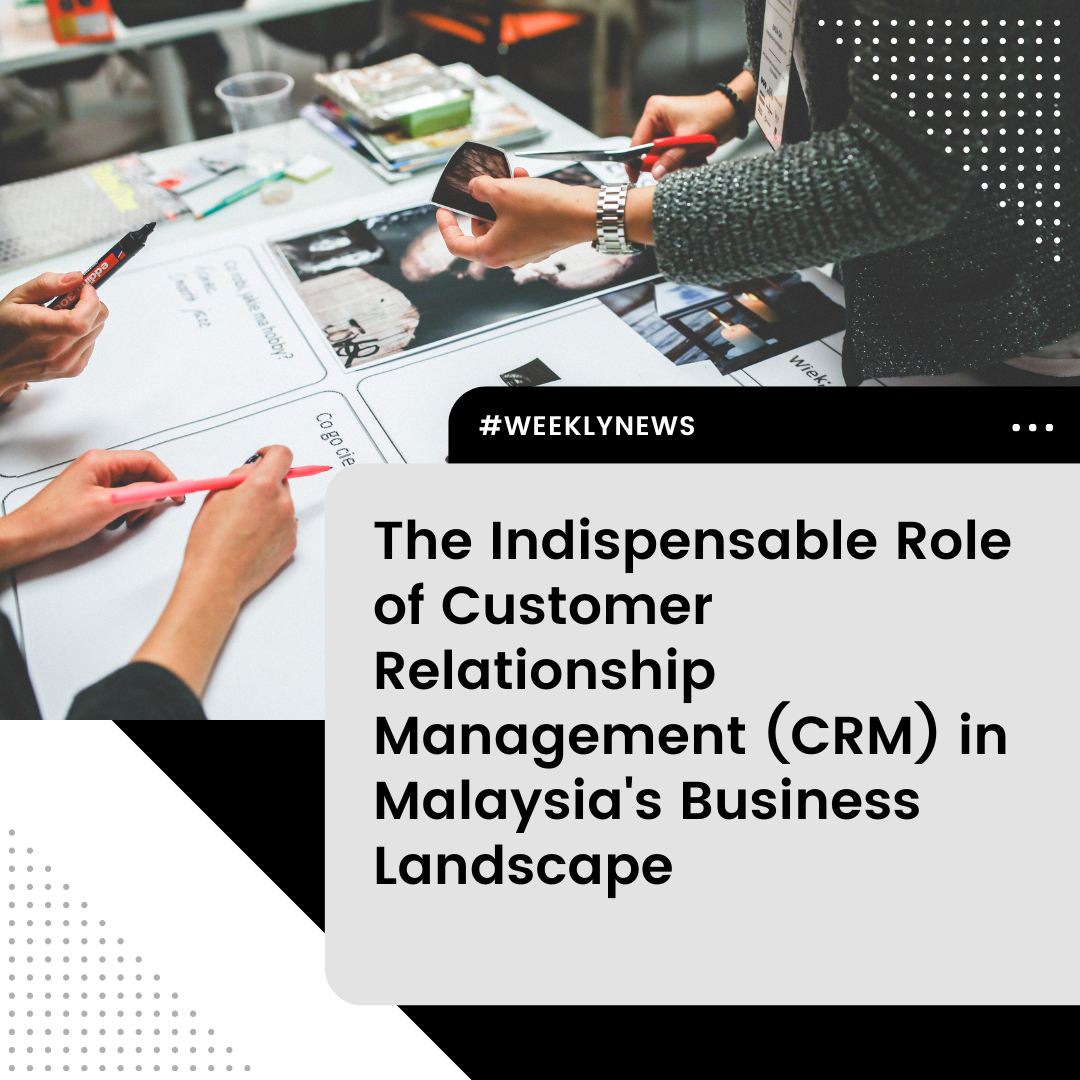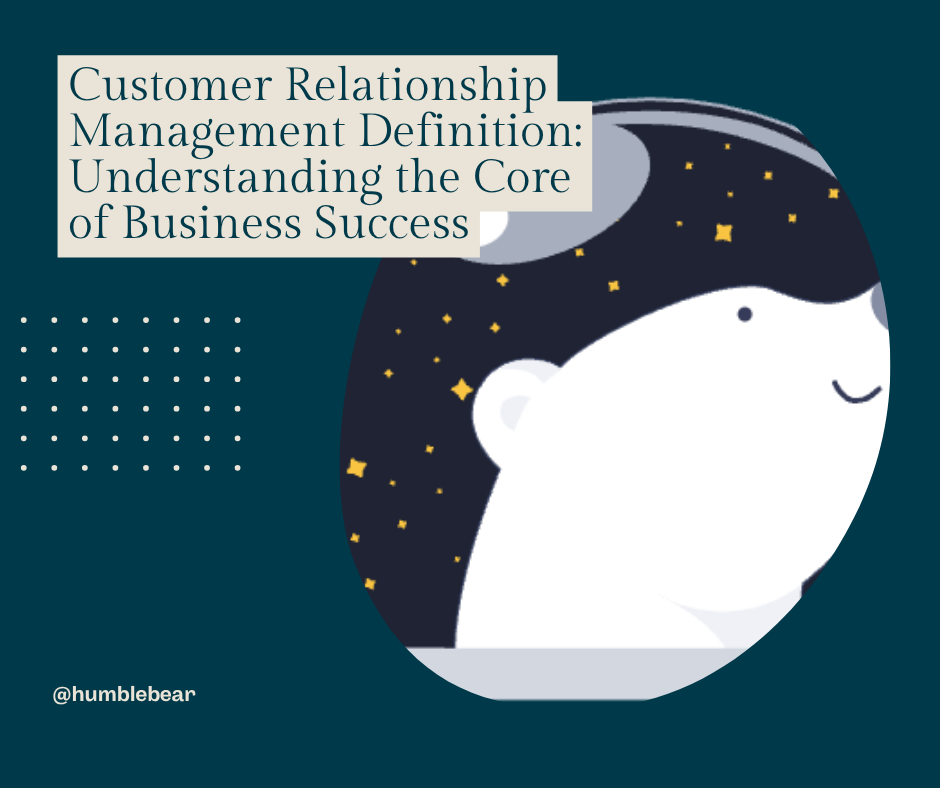Customer Relationship Management (CRM) in Malaysia Landscape

In today's hyper-connected and competitive global economy, businesses are constantly seeking an edge. Beyond innovative products and efficient operations, the true differentiator often lies in how well a company understands, engages with, and retains its customers. This is where Customer Relationship Management (CRM) emerges as a critical strategic imperative. Far from being just a software tool, CRM represents a holistic approach to managing a company's interactions with current and potential customers, aiming to improve business relationships, drive growth, and enhance customer satisfaction.
1. What is Customer Relationship Management (CRM)?
At its core, Customer Relationship Management (CRM) is a technology-driven strategy for managing all your company's relationships and interactions with customers and potential customers. The goal is simple: improve business relationships to grow your business. A CRM system helps companies stay connected to customers, streamline processes, and improve profitability.
Think of CRM as a central hub for all customer-related information. It gathers data from various touchpoints – website visits, phone calls, emails, social media, marketing campaigns, and sales interactions – and organizes it into a comprehensive profile for each customer. This unified view allows businesses to:
Understand Customer Behavior: By tracking interactions and preferences, businesses can gain deep insights into what customers want and how they behave.
Streamline Sales Processes: CRM automates tasks, manages leads, tracks sales pipelines, and provides sales teams with the necessary information to close deals more efficiently.
Enhance Marketing Efforts: With segmented customer data, marketing teams can create highly targeted campaigns, personalize communications, and measure campaign effectiveness.
Improve Customer Service: Agents can access complete customer histories, enabling them to provide faster, more informed, and personalized support, leading to higher customer satisfaction.
Foster Collaboration: Different departments (sales, marketing, customer service) can share information seamlessly, ensuring a consistent and positive customer experience across all touchpoints.
CRM systems typically fall into three main categories:
Operational CRM: Focuses on automating customer-facing processes, including sales force automation, marketing automation, and service automation.
Analytical CRM: Deals with collecting and analyzing customer data to gain insights into customer behavior and improve decision-making.
Collaborative CRM: Aims to facilitate communication and information sharing between different departments within the company, as well as with external partners, to enhance customer interactions.
Ultimately, a robust Customer Relationship Management strategy empowers businesses to build stronger, more loyal customer relationships, which are the bedrock of sustainable growth.
2. Why is Customer Relationship Management CRM in Malaysia so Important?
Malaysia's dynamic economic landscape, characterized by rapid digital adoption, a burgeoning SME sector, and increasing global competition, makes Customer Relationship Management not just beneficial but essential. Here's why CRM holds significant importance in the Malaysian context:
Competitive Market: The Malaysian market is increasingly competitive across various sectors. Businesses need to differentiate themselves not just on price or product, but on the quality of their customer experience. CRM enables this differentiation by fostering personalized and consistent interactions.
Relationship-Driven Culture: Malaysian business culture often places a high value on personal relationships and trust. CRM systems help formalize and scale these relationships, ensuring that every customer feels valued and understood, even as the business grows.
Digital Transformation & E-commerce Growth: Malaysia is experiencing a significant surge in digital adoption and e-commerce. As more customer interactions shift online, CRM becomes vital for tracking digital footprints, managing online inquiries, and personalizing the digital customer journey.
SME Empowerment: Small and Medium Enterprises (SMEs) form the backbone of the Malaysian economy. For SMEs, efficient resource allocation and customer retention are paramount. CRM provides the tools to manage customer data effectively, optimize sales efforts, and deliver excellent service without needing extensive manual processes.
Data-Driven Decision Making: In a fast-evolving market, businesses need to make informed decisions quickly. CRM provides rich data on customer preferences, sales trends, and service performance, allowing Malaysian businesses to adapt strategies, identify new opportunities, and mitigate risks.
Customer Retention & Lifetime Value: Acquiring new customers is often more expensive than retaining existing ones. CRM helps identify at-risk customers, enables proactive engagement, and facilitates loyalty programs, thereby increasing customer lifetime value – a crucial metric for long-term profitability in Malaysia.
Compliance and Data Privacy: With regulations like the Personal Data Protection Act (PDPA) 2010, Malaysian businesses must handle customer data responsibly. A well-implemented CRM system helps ensure data security, proper consent management, and compliance with privacy regulations.
In essence, for Malaysian businesses navigating a complex and evolving market, Customer Relationship Management is the strategic compass that guides them towards customer-centricity, operational efficiency, and sustainable growth.
3. Which Industries Need Customer Relationship Management CRM in Malaysia?
While the benefits of Customer Relationship Management are universal, certain industries find CRM particularly indispensable due to their unique operational models, customer interaction volumes, or sales cycles. Here are some key industries that heavily rely on CRM:
Sales-Driven Industries (e.g., Real Estate, Automotive, Financial Services): These industries thrive on lead generation, nurturing prospects, and managing long, complex sales cycles. CRM helps track every interaction, schedule follow-ups, manage contracts, and analyze sales performance, ensuring no lead falls through the cracks.
Service-Oriented Industries (e.g., Banking, Insurance, Healthcare, Telecommunications): Customer satisfaction and retention are paramount here. CRM allows these industries to manage customer inquiries, service requests, policy details, appointment scheduling, and personalized communication, leading to improved service delivery and customer loyalty.
Retail and E-commerce: With vast customer bases and diverse product offerings, retailers use CRM to track purchase history, manage loyalty programs, personalize marketing messages, and provide targeted promotions, enhancing the shopping experience and driving repeat business.
Manufacturing and Distribution (B2B Focus): For businesses dealing with other businesses, CRM is crucial for managing complex client accounts, tracking large orders, handling supply chain interactions, and maintaining long-term relationships with distributors and partners. It helps manage quotes, project timelines, and after-sales support.
Education: Educational institutions use CRM to manage student admissions, track alumni relations, handle donor management, and personalize communication with prospective students, current students, and their families.
Hospitality and Tourism: Hotels, resorts, and travel agencies leverage CRM to manage bookings, personalize guest experiences, track preferences, and run targeted marketing campaigns for repeat visitors.
IT and Technology: Given the subscription-based models and ongoing support requirements, tech companies use CRM to manage client accounts, track software licenses, handle support tickets, and manage customer success initiatives to reduce churn.
Consulting and Professional Services: Firms providing legal, accounting, marketing, or consulting services use CRM to manage client engagements, track project progress, billable hours, and maintain strong client relationships for repeat business and referrals.
In essence, any industry that relies on building and maintaining strong relationships with its customers, managing a sales pipeline, or providing ongoing service will find immense value in implementing a robust Customer Relationship Management system.
4. How HumbleBear CRM Can Help in B2B Business?
HumbleBear CRM, accessible at https://humblebear.app, is specifically designed to address the intricate demands of Business-to-Business (B2B) operations. B2B sales cycles are typically longer, involve multiple stakeholders, require extensive relationship nurturing, and often deal with higher value transactions. HumbleBear CRM offers a suite of features tailored to streamline these complexities and drive growth for B2B enterprises.
Here’s how HumbleBear CRM can be a game-changer for B2B businesses:
Centralized and Comprehensive Client Data: B2B relationships are built on history and context. HumbleBear CRM provides a single, unified view of every client account. This includes contact information for multiple stakeholders within an organization, communication history (emails, calls, meetings), past purchases, service requests, and even social media interactions. This centralized data ensures that every team member has the complete picture before engaging with a client, leading to more informed and personalized interactions.
Robust Lead and Opportunity Management: B2B lead generation can be complex, involving various channels from referrals to trade shows. HumbleBear CRM helps businesses capture leads from diverse sources, qualify them based on predefined criteria, and assign them to the appropriate sales representatives. It allows for detailed tracking of each opportunity through every stage of the sales pipeline, from initial contact to proposal submission and closing. This visibility helps identify bottlenecks and forecast revenue more accurately.
Streamlined Sales Pipeline Visualization and Forecasting: B2B sales often involve multiple stages and decision-makers. HumbleBear CRM offers intuitive visual pipelines that allow sales teams and management to see the progress of every deal at a glance. This clarity enables better resource allocation, proactive intervention when deals stall, and more reliable sales forecasting, which is crucial for business planning and resource management.
Automated Relationship Nurturing and Follow-ups: Maintaining consistent communication is vital in B2B. HumbleBear CRM can automate routine follow-up tasks, send personalized email sequences based on client behavior or pipeline stage, and set reminders for key interactions. This ensures that prospects and clients are consistently engaged without overwhelming the sales team with manual administrative work.
Enhanced Team Collaboration: B2B deals often require input from various departments – sales, technical support, legal, and finance. HumbleBear CRM facilitates seamless internal collaboration by allowing team members to share notes, assign tasks, and communicate within the system. This ensures that everyone is on the same page, leading to quicker responses and a more cohesive client experience.
Customizable Workflows and Reporting: Every B2B business has unique processes. HumbleBear CRM offers flexibility to customize workflows to mirror a company's specific sales process, from lead qualification to contract signing. Its robust reporting and analytics features provide actionable insights into sales performance, marketing campaign effectiveness, customer service metrics, and overall relationship health, enabling data-driven strategic adjustments.
Account-Based Marketing (ABM) Support: For B2B, focusing on key accounts is often more effective than mass marketing. HumbleBear CRM supports ABM strategies by allowing businesses to segment and target specific high-value accounts with tailored content and outreach, maximizing conversion rates and strengthening strategic relationships.
Scalability for Growth: As a B2B business expands, its client base and operational complexities grow. HumbleBear CRM is built to scale, accommodating increasing data volumes, more users, and evolving business needs without compromising performance or efficiency.
By centralizing data, automating processes, and providing deep insights into client interactions, HumbleBear CRM empowers B2B businesses to build stronger, more profitable relationships, shorten sales cycles, and achieve sustainable growth in the competitive Malaysian market and beyond.
5. Conclusion
In an era where customer experience is paramount, Customer Relationship Management (CRM) has transcended its definition as merely a software solution to become a fundamental business philosophy. It is the strategic backbone that enables companies to understand their customers intimately, engage with them effectively, and foster loyalty that drives long-term success.
For businesses in Malaysia, CRM is particularly vital. The nation's competitive landscape, relationship-centric business culture, and rapid digital transformation necessitate a sophisticated approach to managing customer interactions. From large enterprises to the thriving SME sector, industries across the board – including sales, service, retail, manufacturing, and technology – are realizing that investing in CRM is not an option, but a necessity for survival and growth.
HumbleBear CRM stands out as a powerful ally for B2B businesses, offering tailored functionalities that address the unique challenges of complex sales cycles, multi-stakeholder relationships, and the need for deep client insights. By providing centralized data, robust lead management, pipeline visualization, and enhanced collaboration, HumbleBear CRM empowers B2B companies to cultivate stronger partnerships, optimize their sales and marketing efforts, and ultimately, achieve sustainable profitability.
As businesses continue to navigate an increasingly customer-driven world, the strategic implementation of Customer Relationship Management will undoubtedly remain the cornerstone of building lasting relationships and securing a prosperous future.











